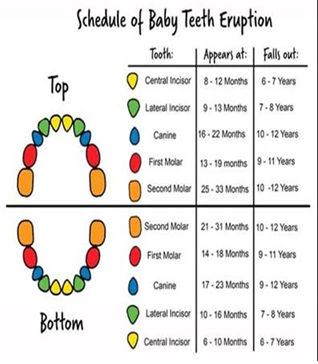When do infants start to erupt teeth? All the Information You Need to Know About First Teeth
The teething process can be challenging for both you and your child when it starts. Teething can cause stress in both parents and babies because it's not always clear how to help ease the pain associated with the process. Babies can acquire their first teeth as early as three months old or as late as one year old, although the average age for teething and the emergence of the first tooth is approximately six months old.
Knowing as much as possible about when babies start getting their teeth is crucial for identifying the symptoms of teething in infants and for figuring out how to ease the discomfort associated with it.

When Do Infants Begin to Grow Teeth?
Typically, your baby's first teeth erupt around six months of age. Nonetheless, some infants have their first teeth at birth. Some babies start to erupt teeth at four months of age, while others take longer and erupt at one year of age.
The teeth that erupt first in the bottom front are called bottom incisors. Usually, the incisors erupt for the first time when a baby is five to seven months old. The upper incisors in the front of the mouth are the next teeth to erupt.

What Indicates a Baby Is Teething?
While each baby's teething symptoms may vary, they typically include the following symptoms:
- A mild fever that doesn't exceed 101 degrees
- Coughing
- Gums that are swollen and tender
- Placing their hands close to their lips
- Modifications to sleeping or eating habits
- Weeping and being picky
- Attempting to bite or chew on hard objects
- Too much drool
- Stroking their faces
- Feeling uneasy
- Decreased enthusiasm for solid foods
- Swollen or sensitive gums
- Taking off their ears
- Sensitivity
- Increased sucking
How Much Time Does Pain During Teething Last?
Teething pain affects babies from the moment a new tooth pierces their gums until a few days later.
A new tooth's eruption typically causes pain that lasts for one week per tooth. A week might not seem like much, but if your baby gets several new teeth at once, it can seem like a very long time.
Babies gums frequently swell, turn red, or seem to bulge when they are teething. Because of the irritation, they might also have a facial rash or flushed cheeks. A new tooth can be identified by looking at its gums.
Gently touch your baby's gums to check if there is a tooth growing underneath after washing your hands. You should not touch a blister that you see. Blisters are common and will go away on their own. Beneath the gums, a newly erected tooth appears pink and protrudes.
A tiny white section of the tooth will pierce the gums when it breaks through for the baby.
Is Pain During Teething Stop After the Tooth Cuts?
Yes, once the tooth pierces the gums, the pain associated with teething ends. While the tooth is attempting to pierce the gums, babies are in pain. After it cuts, the pain stops. There are a few things you can do to help ease teething pain.
- Rub or massage the gums gently with clean fingers.
- Give the infant a firm rubber teether to chew on or suckle (you can refrigerate the teether)
- Serve up some crunchy foods, like a cold, peeled carrot or cucumber.
- Use a cool washcloth to gently massage their gums.
- To help with pain relief, try using an over-the-counter medication like ibuprofen or acetaminophen.
- Dry your drool to avoid irritating your skin.
